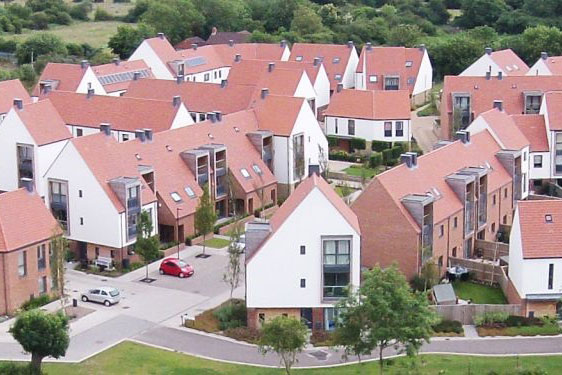
A sustainable community? Life at Derwenthorpe
Context
Forty-two percent of UK CO2 emissions result directly from actions taken by individuals linked to housing, food, energy and personal travel. Derwenthorpe is being developed as an urban extension of over 500 new homes in York, through a partnership between the Joseph Rowntree Housing Trust, Barratt/David Wilson Homes and the City of York Council. The development aims to provide both a socially and environmentally sustainable community and includes eco-friendly, energy efficient homes; incentives for lifestyle change to reduce environmental impact, and the promotion of community participation and long-term stewardship.
Aims and objectives
The overall aim of the research was to ascertain the extent to which the Derwenthorpe development creates an environmentally and socially sustainable community. The project was designed to identify lessons which can be learnt from the scheme in relation to supporting energy efficiency in the home and beyond, facilitating sustainable lifestyles among residents and encouraging social mix in the context of a mixed tenure scheme.
The evaluation methods included longitudinal (repeat) interviews with residents and the use of a carbon footprint survey tool (REAP Petite) which allowed comparison to national data collected by the tool.
Findings and outcomes
The key message from the project was that mainstream housing developers can successfully deliver sustainable homes and communities at scale that produce high-quality living environments. However, different levels of buy-in from residents mean that environmental and social measures need to be built into the model as far as possible from the outset.
The project recommends the following:
- Greater emphasis on the design, space standards and the aesthetics of new developments should be incorporated into Government-level directives.
- Housing providers must work with resident groups to set up inclusive governance structures to promote the long-term social sustainability of communities.
- Architects and developers need to ‘build-in’ environmental interventions into new homes, rather than choosing technology that requires resident knowledge and operation. They also should consider how they can influence residents’ overall carbon footprints.
Project activities and publications
Project Partner
Key York contacts
- Deborah Quilgars (Centre for Housing Policy)
- Dr Sarah West (Stockholm Environment Institute York)
Principal and Co- Investigators
Principal Investigator
-
Deborah Quilgars (Department of Social Policy and Social Work, University of York)
Co-Investigators
- Dr Alison Dyke (Stockholm Environment Institute York)
- Professor Rebecca Tunstall (School for Business and Society, University of York)
- Dr Sarah West (Stockholm Environment Institute York)
- Dr Alison Wallace (School for Business and Society, University of York)
Principal funder
Joseph Rowntree Foundation
External partners
- Joseph Rowntree Housing Trust
- Barratt/David Wilson Homes
- City of York Council

